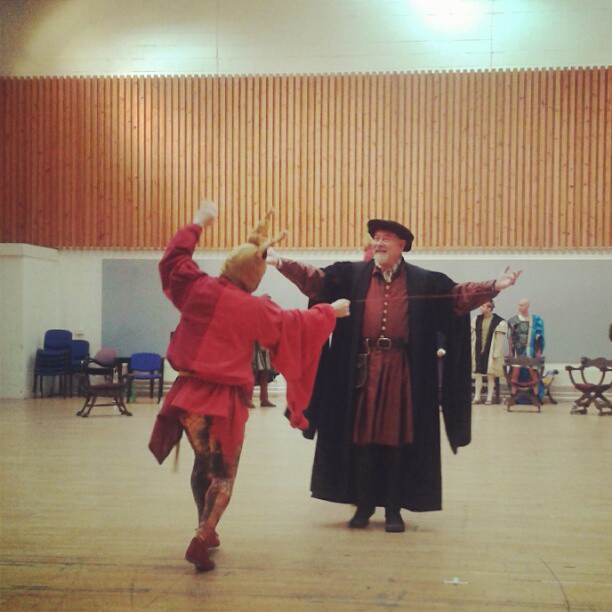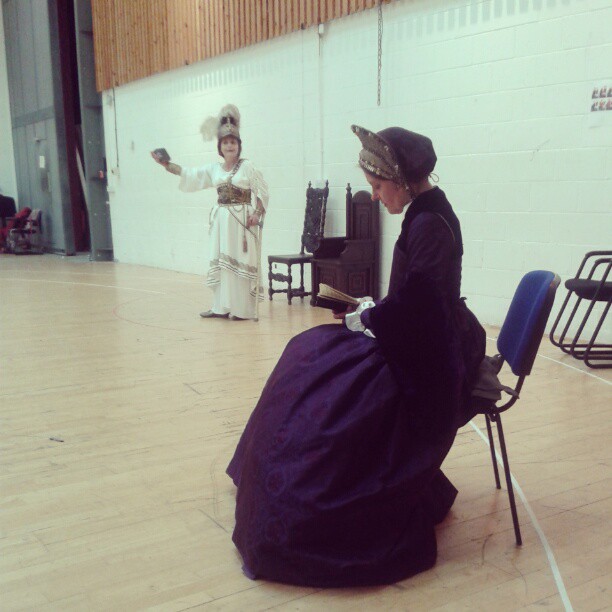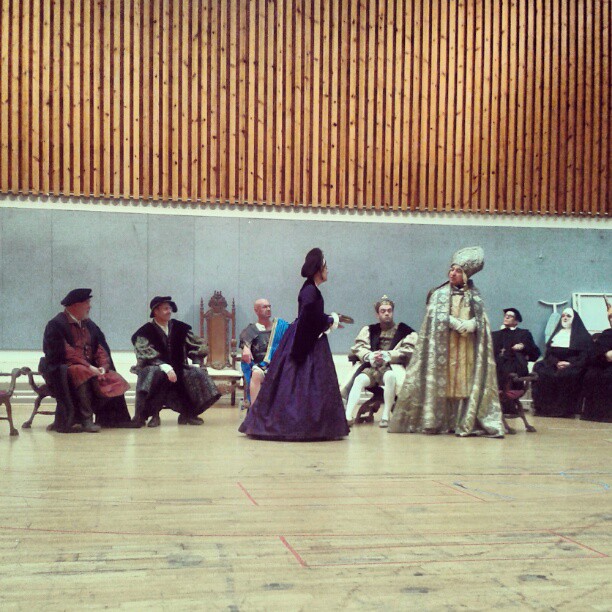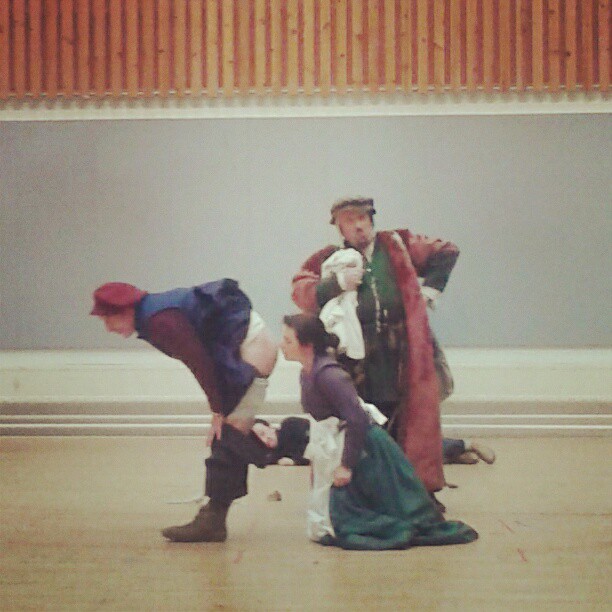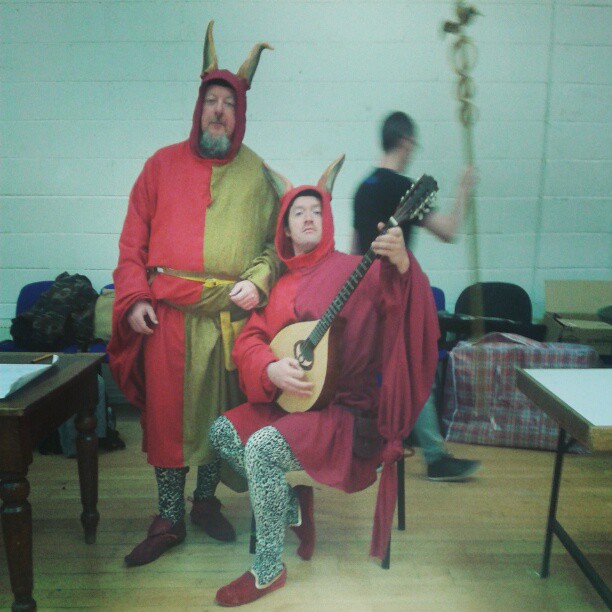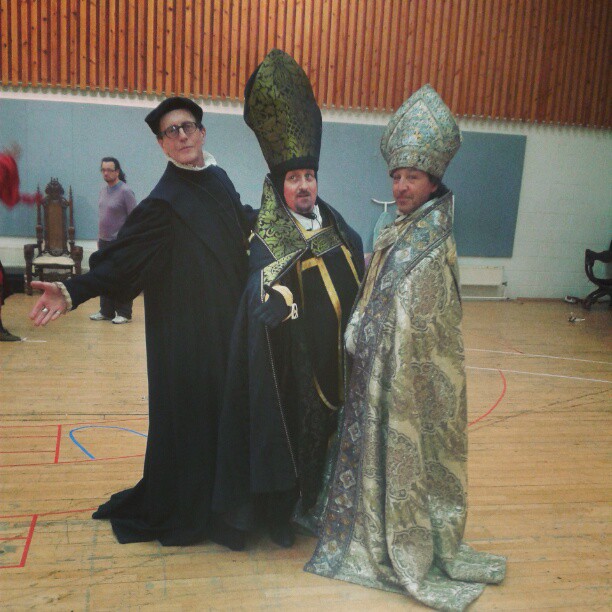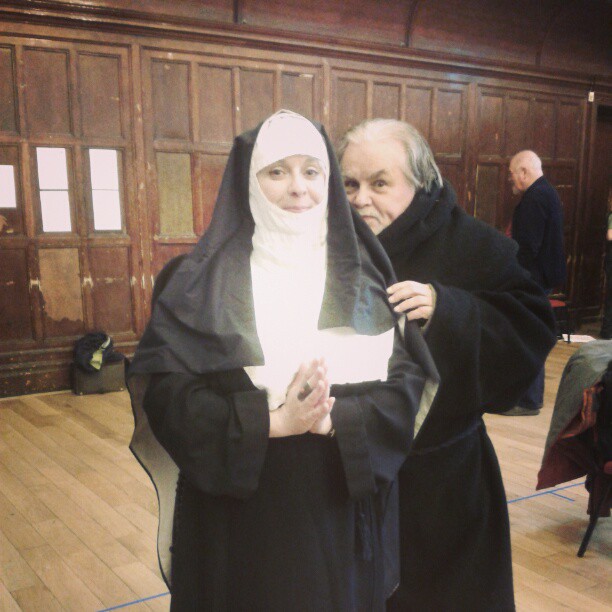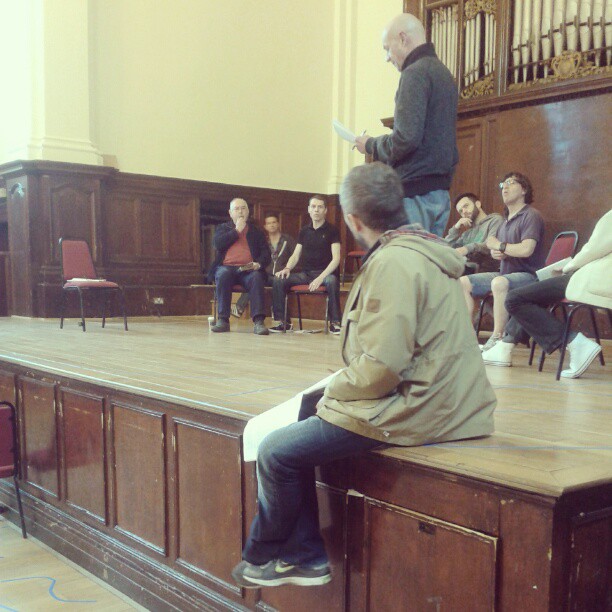We were very grateful when Kirsty Wark agreed to talk to us about the Satyre of The Thrie Estaitis over the phone this week. Â She was incredibly knowledgeable about the play’s political dimensions and performance possibilities, and wholeheartedly supported the production. Â Below are the edited highlights of the conversation. Thanks Kirsty!
Rehearsal blog – day 22 (4.6.2013)
We did a full-run of the play today: part 1 in the morning, and part 2 in the afternoon. It was especially good to see the ensemble nature of performance between Flattery, Falsehood and Deceit developing. There was much laughter in the rehearsal room at the trio. What Tom noted the other day about Gerdaâs performance in Part 2 is also true of part 1, Good Counsel really emerges as a voice of reason against the sheer exuberance and chaos in this hald. This is especially evident when she is rejected from the court, but reacts by saying, âSen at this time I can get na presence,/ Is na remeed but take in patienceâ and goes quietly into a corner to read her Bible. Against all the madness, she is an oasis of calm.
In the afternoon we looked at Part 2. At one point I found myself sitting in the âfieldâ taking photos of the parliament and it was an interesting experience. Even though you are spatially excluded to some extent, the fact that action is happening all around you and that you are seated so close to the parliament means that you become a really active listener. I was reminded of James Vâs publication of The New Actis and Constitutionis in 1542 â readers of which might not have been able to alter the legislation but were nevertheless privy to previously closed institutional processes.  Maybe this is a dramatic equivalent of such publication of parliamentary proceedings.
We also staged the arse-kissing divorce. Pictures speak louder than words!
Alex Salmond on Satire of Three Estates
Here’s what Scotland’s First Minister, Alex Salmond has been saying about Satire of Three Estates
 “David Lyndsay’s’ ‘Satire of the Three Estates’ was an extraordinarily bold piece of theatre given the political context in which it was first performed in 16th century Scotland. The play raises profound questions about the nature of monarchy, the role of the popular voice in Scottish politics, the nature of Scottish civic, national and religious identity, and the moral fabric of civil society; themes which still have the power to resonate with us almost 500 years later.
“David Lyndsay’s’ ‘Satire of the Three Estates’ was an extraordinarily bold piece of theatre given the political context in which it was first performed in 16th century Scotland. The play raises profound questions about the nature of monarchy, the role of the popular voice in Scottish politics, the nature of Scottish civic, national and religious identity, and the moral fabric of civil society; themes which still have the power to resonate with us almost 500 years later.
In today’s context the play stands out as one of the greatest pieces of literature in the Scots language and I am delighted that it will be performed for modern audiences this June at Scotland’s historic venues of Linlithgow Palace and Stirling Castle.”
Rehearsal blog – day 21 (3.6.2013)
Today we had the first full fitting of the costumes, allowing us for the first time to see the magnificent work of Hilary Lewis and her team. The courtly costumes are sumptuous, and the vices, with their scaly legs and huge tufted ears both comic and slightly sinister in their animalism. Correctionâs wings were again a highlight, as was the Abbottâs strikingly oversized mitre. Special work was spent in the morning on the tricky scenes in which the clergy were disrobed, which need to be swift and comic.
The seating in parliament for part two was rearranged to have the three estates alone sitting alongside Rex and Correction, with the other clergy placed behind Spirituality and the Courtiers and Good Counsel behind the secular estates. This made the power politics of the session more starkly evident, giving graphic evidence for Temporalityâs defiant claim to Spirituality that âye are but ane estate and we are twaâ.
We also worked on the final lines, and the singing that will accompany Follyâs sermon and provide the play with a resounding climax and the cast with a curtain call.
Rehearsal blog – day 20 (31.5.2013)
The morning was spent working intensely on the first part of Act 2. It was noticeable the change in the tone of the piece between Act 1 where reform seems relatively easy to the detailed to debates that are required in Act 2 to restore the commonweal. In rehearsal what becomes apparent is the extent to which Parliament often becomes a row between the clergy on one side and John the Commonweal and the Pauper on the other. Tom McGovernâs Spirituality is not simply a corrupt cleric, as the role has developed he has become more and more dangerous and disturbing. It was also interesting to note the amount of variation that Paul Cunningham as Temporality and Michael Mackenzie as Merchant found in their roles; as the play focuses more and more on the corruption of the clergy Temporality and Merchant become allies to Divine Correction and Rex Humanitus. In particular, during the rehearsals this morning Temporalityâs role in placing the focus on the clergy, with Merchantâs support, came to the fore.
It was also interesting to note how important Good Counselâs role is in the first part of Act 2 in keeping the Parliament on track. Gerda Stevensonâs Good Counsel is consistently the voice of reason and in rehearsal there were a number of moments when having a woman playing the role really brought out its rational and calming status. When all the men were shouting at each other it was Good Counsel who brought them back on track with her wisdom and patience.
The afternoon was taken up with a fight call and further work on Act 2.
Rehearsal blog – day 19 (30.5.2013)
The morning began with rehearsal of the hanging again, a very technical part of the play. Jimmy Chisholm and Barrie Hunter were making marvellous sense of their long and complex gallows speeches.  Thereâs an interesting shift from iambic tetrameter to iambic pentameter in Falsetâs final speech, which registers a shift in tone from a denouncement of the local craftsmen to rulers, prelates, judges in general â but also wives dwell amongst this illustrious company?!
Before lunch, we re-rehearsed the Folly/Rex/Diligence ending of the play. This is very much a three-way dynamic which speaks of a particular triad of courtly life in the play, and perhaps the personal vision of Lyndsay. Diligence, the assiduous herald who is widely seen as a Lyndsay figure, mediates the passage of Folly to the King â does this tell us something about the playwright himself? I was reminded of Jamie Reid-Baxter saying that Diligence and Folly are refractions of Lyndsayâs own character.
In the afternoon, there was a real festival atmosphere as 30-odd âjesters, jugglers and bauble-bearersâ prepared to run Part One of the play. It was fascinating to see the skilful dramaturgy of Lyndsay in the first half take shape. Enough time is spent setting up the Kingâs fall that Good Counsel appears at the opportune moment to cast a virtuous perspective on the events. And just as her voice of sense is registered, the level of Vice is ramped up by the entry of Flattery, Falset and Dissait. The middle part of the first half marks the nadir of Rexâs reig; his enthrallment to Sensuality, his employment of evil personnel, and rejection of Good Counsel. Verityâs entrance is the fulcrum from which point the reformation of the king is anticipated, although it his transgression is also heightened by the introduction of notions of religious truth and sin rather than simply the political and social evils of the first half. We are then led via Verity and Chastity to the ultimate appearance of Divine Correction and the restoration of good order at Rexâs court. It is a beautifully crafted piece of drama and only through performance can this craftsmanship be appreciated.
We tried putting the âInterval playâ directly after Part One and it heightened the sense that the dramatic space has been invaded by the Pauper, as both actors and audience have slipped out of âtheatrical modeâ, and had to quickly slip back in.  I wondered whether this was the order of the drama envisaged by Lyndsay as, dramaturgically, he is fascinated with the notion of the false sending. This idea governs the overall structure of the Satyre. Part One finishes in the mode of a traditional morality play, but the finality of this genre is significantly challenged by the parliament drama of Part Two. The interval play is a further, third piece of drama incorporated into the overall play and the Pardonerâs âNow tarry any little, I pray you,/ Till I with you be knownâ â does seem to be designed to further delay an audience itching to get away for the drink Diligence has just suggested. If the interval play was supposed to follow directly on from Part One, this raises an interesting question â is this the âbest pairt of the playâ that Diligence has just promised? With the Pauperâs tale of woe, the arse-kissing divorce, and the interchanges of the Pardoner with other characters â it is certainly one of the funniest.
Cupar Bans performances 1st and 2nd June
The Cupar Bans will perform this weekend at:
The West End Festival , Glasgow at Kelvingrove Museum tomorrow afternoon ( 1st June) at 1pm and 1.30pm.
Scottish Parliament, Edinburgh on 2nd June at 11.30am , 1pm and 2pm
Here we have an short interview with The Linlithgow Players on the performance at the Farmers Market on 25th May.
Rehearsal blog – day 18 (29.5.2013)
We started off by running Act 2. It was really interesting to see the political space materialised with so many of the cast members inhabiting it. Particularly striking was the relationship between the Pauper, parliament and audience, with David McKay speaking upstage but frequently taking in the crowd as the poor âcommounâ, speaking as and for them. There was an enlightening change marked between John and Pauper assuming they will not be listened to when they first approach the parliament, followed by their surprise when they realise that Divine Correction has their back â it is the movement from their oppression to their enfranchisement in the play.  Also interesting was the âroundingâ together of the Spirituality in the Parliament to take advisement on the laws being proposed â their secret conversations seemed in stark contrast to the transparency of the rest of the political space. There seemed to be so many members of the Spirituality on the stage â Bishop, Abbot and Parson, as well as the  Friar and Prioress just behind them â as opposed to the self-representing Merchant and Temporality.
We also charted the various responses to John and Pauperâs assertions of âWere I ane Kingâ and âWere I ane papeâ with the parliament finding these challenging statements. Most important though was Rexâs reaction- he stands in some sort of defiance against Pauper but also listens thoughtfully. During the Parliament we are witnessing Rexâs bettering as a monarch.
The staging of the Parliament continued into the afternoon â this is definitely one of the most complex parts to realise given the complexities of political access and space in the play.  There is also the question of finding the appropriate reactions. The Parliament, for instance, stand in sequence when John the Commonwealth shows forth his true faith (the Spirituality reluctantly) â their honorific response demonstrates the verity of Johnâs words. The reactions of the Parliament help to mark the various episodes of this long scene, while mitigating against the action becoming static.
Rehearsal Blog – day 17 (28.5.2013)
Today we concentrated on the entry of the Three Estates âgangand backwartâ and John the Commonwealâs appearance. Â We read through the whole of the second half of the play to the hanging of the Vices, and broke the Parliament down into its constituent parts.
The Director, Gregory Thompson worked with the actors playing the Estates and their vices on the practicalities and principles of their backward entry. It was decided that the Estates, with the exception of Spirituality, had no sense that they were being led like puppets by the Vices Covetise, Flattery, Deceit, Falsehood and Sensuality. As Spirituality would later say, they see nothing wrong with what they are doing. They think they âgang right wonder pleasantlyâ. So we saw the Estates waving obliviously to the audience as they are dragged backwards by capering Vices who are to them invisible. (A lot of time was spent on getting the movements right, to music provided by John Kielty with Annie Grace and Kern Falconer.)
It is only when John exposes the Vices âlurkingâ behind them that Merchand and Temporality see to their horror how they have been deceived by their worst instincts. The Vices are then dragged off to the stocks. We then worked on the impact of Johnâs address to parliament â how the members react to this bold intrusion, and what the Spirituality make of the ominous references to âreformationâ which start to echo around the stage.
Performance of the Cupar Bans: 25th May, Linlithgow
We performed an edited version of the Cupar Bans at Linlithgow Market Square and Regent Square on Saturday.





